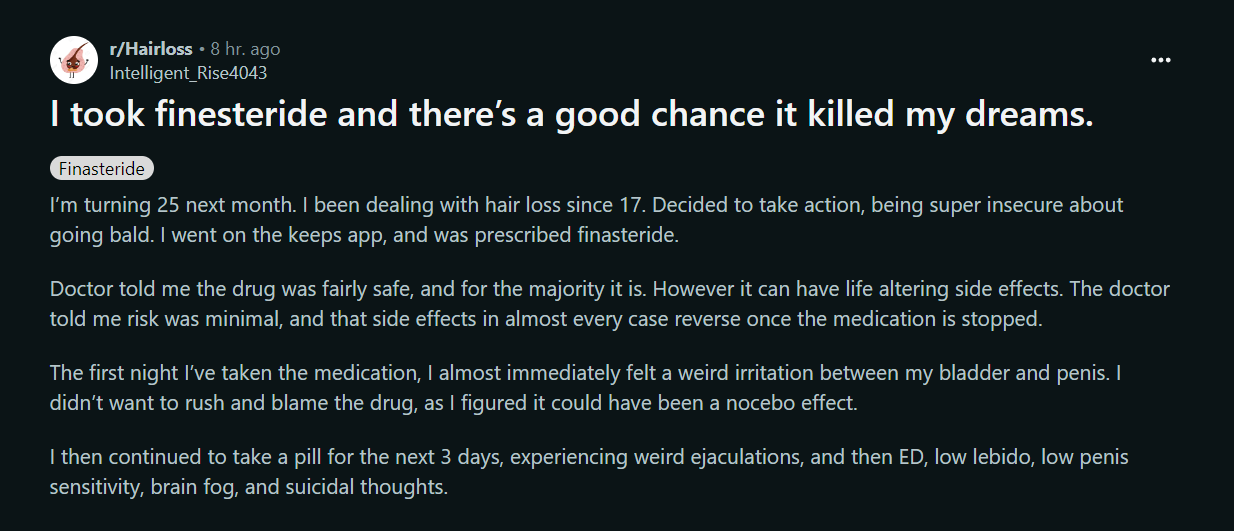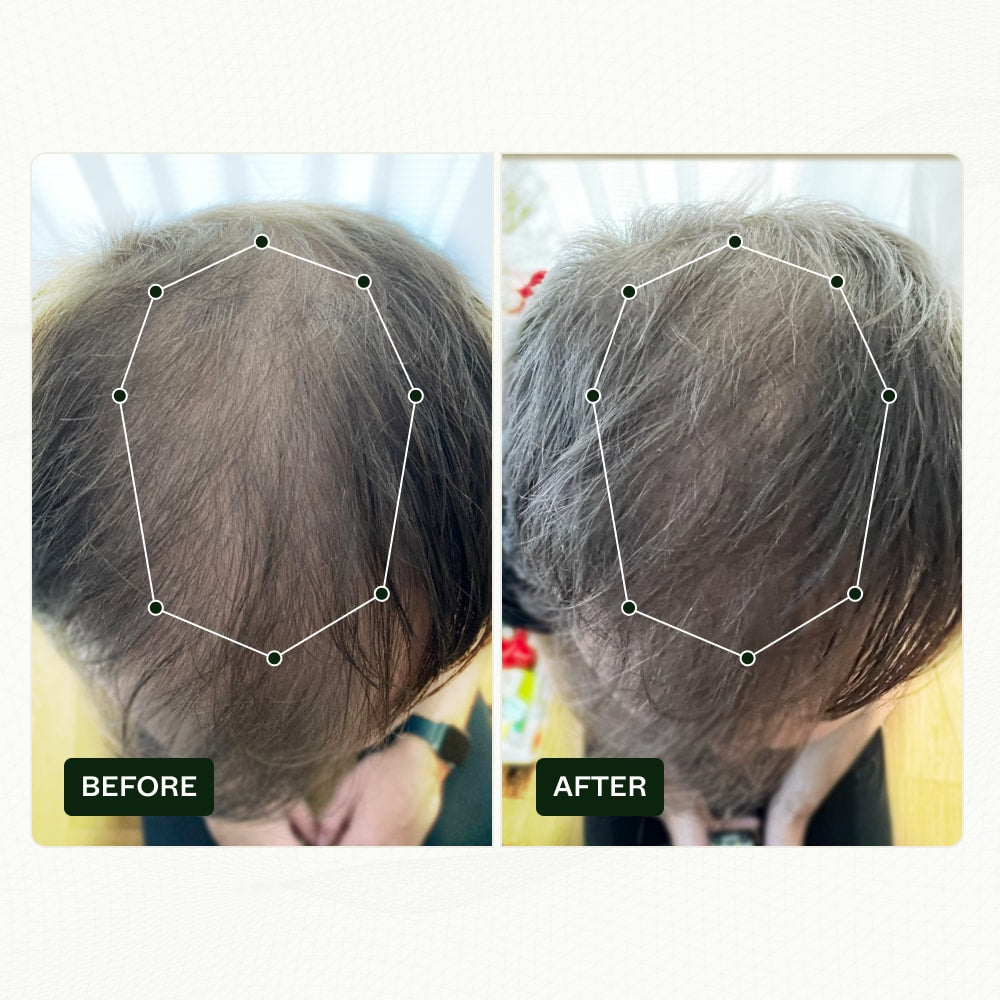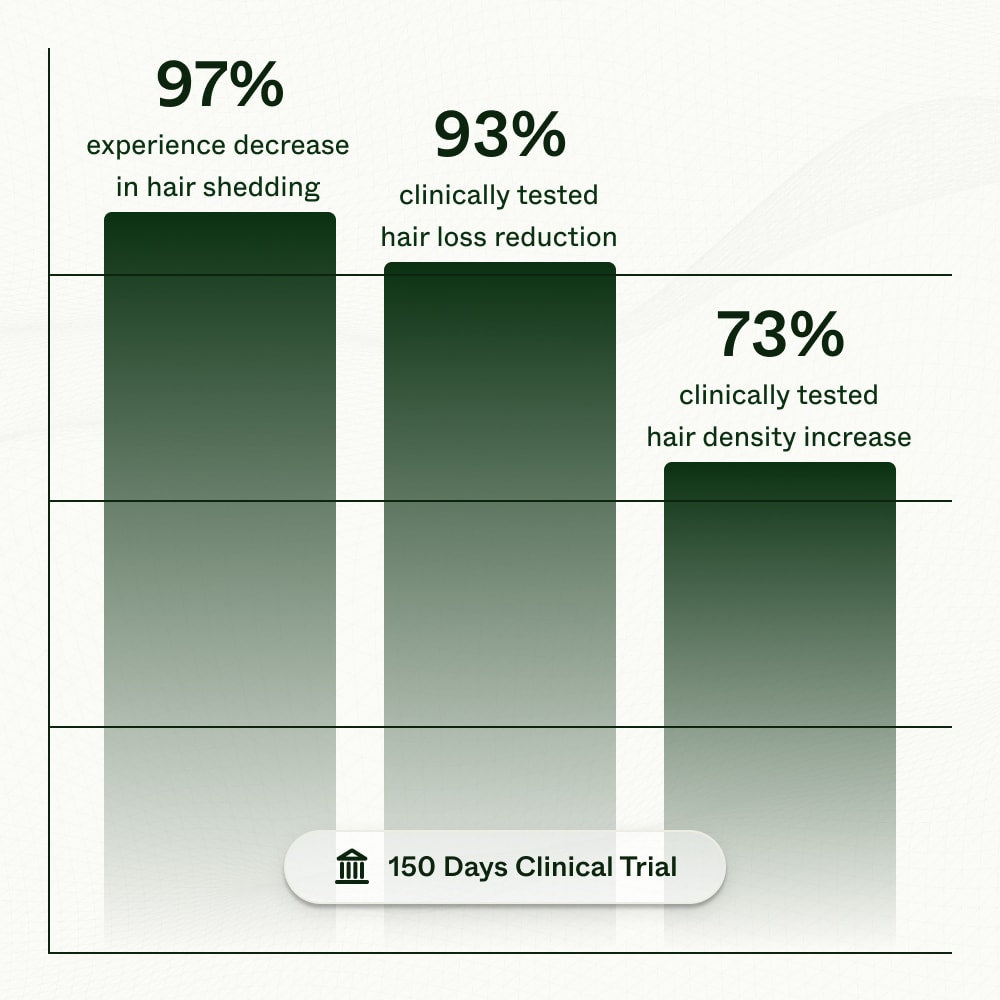While rare, post finasteride syndrome has affected multiple lives negatively across the world.
A lot of people, who have taken finasteride either for benign prostatic hyperplasia or male pattern baldness, have spoken out about their experience with post finasteride syndrome.
In this article, we'll go over the definition of post finasteride syndrome (PFS), its potential persistent symptoms, and the burning question: Is post finasteride syndrome real?
Table of content
What Is Post Finasteride Syndrome?

Post Finasteride Syndrome (PFS) refers to a set of persistent sexual, mental, and physical symptoms that some men experience after taking finasteride or stopping finasteride.
Finasteride is a commonly prescribed drug to treat male pattern baldness (androgenetic alopecia) and benign prostatic hyperplasia (BPH).
Finasteride works by inhibiting the conversion of testosterone to dihydrotestosterone (DHT) in the body. The DHT hormone involved in the hair cycle and enlarged prostate growth.
While finasteride is generally well-tolerated, some men have reported symptoms and adverse effects long after stopping the medication.
As your leading source for hair health information over the past 4 years, we never compromise on accuracy. When it comes to your health, you deserve information you can truly rely on - and earning your trust is our top priority.
Here's how Scandinavian Biolabs ensures every piece of content meets the highest standards of accuracy and integrity:
- Credentialed Experts: Our reviewers are actively practicing doctors and medical researchers
- Stringent Reviews: Content undergoes rigorous editing by subject specialists and review by a practicing doctor.
- Evidence-Based: We rely on well-established research from trusted scientific sources like peer-reviewed journals and health authorities.
- Full Transparency: Our editorial standards, writer credentials, reviewer credentials, correction process, and funding are all publicly documented.
- Independent Voice: While we do promote products, we operate in a vacuum to business operations. Our main goal is just an unwavering commitment to providing medically-sound guidance.
You can count on Scandinavian Biolabs to consistently deliver the trustworthy health information you deserve. Read our Editorial Standards.
Is There A Cure To Post Finasteride Syndrome?
There is currently no known cure for post finasteride syndrome or its adverse effects. However, there are support groups like the Post Finasteride Syndrome Foundation and communities you can seek to be a part of.
Is Post Finasteride Syndrome Real?
Whether PFS is a medically recognized condition or not remains controversial within the medical community.
While some dismiss PFS as being psychosomatic in nature, many doctors and researchers now acknowledge that genuine persistent sexual adverse effects and mental adverse reactions can occur in a small subset of men taking finasteride, typically for male pattern hair loss.
Several factors suggest PFS is a real condition:
- Many men reporting PFS symptoms show biological abnormalities. Studies have found lowered libido, erectile dysfunction, and changes in semen count in PFS patients.
- The symptoms reported are consistent. Men from around the world independently report persistent sexual symptoms in addition to mental and neurological symptoms. Their reports are very similar.
- The timing of symptom onset lines up with finasteride use. Men only develop issues after initiating and post finasteride.
- Symptoms persist long after drug elimination. Finasteride has a short half-life, yet side effects linger years later in some. This suggests a biological mechanism beyond the direct presence of the drug.
- Brain imaging studies show differences. Research has found abnormal brain activity patterns in PFS patients compared to controls when exposed to sexual cues.
While more research is still needed, the growing body of scientific evidence suggests that PFS is a real condition for some men, even if doctors do not fully understand the mechanism or know how to effectively treat it in all cases.
Scientific Studies On Post Finasteride Syndrome
Research published in the Journal of Sexual Medicine (J Sex Med) has shown high rates of persistent sexual dysfunction like lowered libido and problems with arousal in finasteride users.
A 2020 study found that patients continued to report sexual symptoms even years after stopping treatment. This suggests the dysfunction may have a biological cause rather than being purely psychological.
Studies have demonstrated altered patterns of brain activity in regions related to sexual function and stimulation for those with PFS.
Lastly, two studies showed that finasteride use results in the worsening sexual function and persistent erectile dysfunction.
Post Finasteride Syndrome Symptoms

Anecdotally, we've seen users on social media writing about the debilitating symptoms they've had to deal with.
Finasteride users with post finasteride syndrome have these reported symptoms:
- Loss of libido and interest in sexual activities
- Finasteride associated male infertility (self-reported) in some cases
- Erectile dysfunction, including inability to achieve/maintain erections
- Diminished morning and spontaneous erections
- Painful orgasms or orgasms that provide no pleasure
- Decreased semen volume and weaker ejaculation force
- Changes to reproductive anatomy like penis or scrotum shrinkage with numbness
- Development of breast tissue in males (gynecomastia)
- Persistent muscle weakness, fatigue, pain and possible breakdown
- Alterations to skin like dryness, rashes and discoloration
- Loss of fat in localized areas or decreased oil gland activity
- Abnormal metabolic markers related to lipids and blood sugar
- Increased risk factor of obesity over time
- Cognitive impairments impacting memory, thinking, focus
- Frequent depressed or anxious mood and emotions
- Insomnia and sleep disturbances such as sleep apnea
- Tinnitus, visual changes, cardiovascular/respiratory issues (reported)
- Suicidal ideation in severe, treatment-resistant cases
- Impacts to work, relationships, and ability to function normally
Sexual dysfunction (erectile dysfunction)
One of the most common and troubling symptoms reported by those with PFS are persistent sexual side effects and enduring sexual dysfunction.
Problems achieving and maintaining erections is among the primary complaints, as some experience erectile issues for the first time following finasteride use.
This can manifest as weak erections, penis shrinkage, diminished libido or sex drive, or even a complete loss of sexual stimulation.
Some describe their sexual dysfunction as sexual anhedonia - the inability to experience pleasure from sexual activities that were previously enjoyable.
Not only is this devastating to relationships and quality of life, but it can also contribute to mental health issues like major depression and anxiety.
The pervasive and enduring nature of these sexual side effects after finasteride cessation illustrates how PFS extends far beyond any individual symptom - it can potentially impact all aspects of physical, mental and social well-being.
More investigation is still required to further characterize the condition and its underlying pathophysiological mechanisms.
Depression/anxiety

Post finasteride patients report major depression or depressive symptoms. This suggests that finasteride use does have potential emotional consequences. More severe cases can lead to suicidal ideation.
Brain fog
Difficulty concentrating, mental confusion, poor memory are neurological issues experienced.
Fatigue
Constant tiredness and low energy levels impact quality of life.
Genitourinary issues
Changes in ejaculate, urinary problems, testicular pain can occur.
The severity and combination of symptoms reported vary greatly between individuals.
In some, symptoms are mild and easily managed, but for others post finasteride syndrome can be completely debilitating. The symptoms also appear to worsen with time for some men.
How to Treat Hair Loss Without Finasteride?
For men concerned about post finasteride syndrome, or side effects in general, there are alternative options to consider to treat hair loss.
Try Scandinavian Biolabs

If you are looking for a natural alternative to finasteride that does not have any harmful side effects, we recommend the Scandinavian Biolabs Hair Growth Routine.
Scandinavian Biolabs has developed a bio-optimized hair growth system that targets hair loss at its root cause, without any harsh chemicals or drugs involved.
Our 3-step Hair Growth Routine was designed by scientists to support your body's own hair growth process in a way that respects your health.
Using only clinically-tested active ingredients, it works by encouraging dormant follicles and reducing shedding - all without interfering with your DHT.

In our 150-day clinical trials, 93% saw a measurable reduction in hair loss and 73% grew back fuller density - just by using our products daily. Customers also report feeling less hair falling out within weeks.
Unlike prescription drugs, there are zero sexual or mental side effects to worry about. Our natural approach allows you to safely and effectively work towards your hair goals, with no risks to your well-being.
We stand confidently behind the routine with a 150-day money back guarantee too. Try it out and see the results for yourself - or your money back.
Use Topical Finasteride Treatment
Topical finasteride solutions, gels and sprays have a much lower systemic absorption rate than oral pills, which means less exposure to the whole body and lower risk of adverse effects. Research shows topical versions can still provide hair loss treatment benefits when applied directly to the scalp.
Stick to Non-Prescription Hair Loss Treatments
Over-the-counter products containing minoxidil (Rogaine) have been clinically proven to stimulate hair regrowth in many men. Herbal supplements like saw palmetto and supplements containing vitamins may also help in mild-moderate hair loss cases.
Consider Hair Transplant Surgery
For those seeking a more permanent solution to male androgenic alopecia, hair transplant procedures involve surgically grafting hair follicles from the back/sides of the scalp to balding areas. While very effective, it requires multiple sessions and the new hair also has a chance of future hair loss.
Take Preventive Lifestyle Measures
Things like managing stress levels, maintaining a healthy scalp, avoiding tight hairstyles, and massaging the scalp can support hair follicles and slow the rate of pattern hair loss. A balanced diet rich in proteins, vitamins and natural DHT blockers is recommended.
Conclusion
In summary, while PFS remains controversial, there is valid scientific evidence that persistent and sometimes disabling side effects can occur in a small subset of men who discontinue taking finasteride for treating hair loss or benign prostatic hyperplasia (BPH).
For those concerned about potential long-term consequences, alternatives to oral finasteride include topical formulations, non-prescription options, hair transplants and preventive lifestyle habits.
More research is still needed to expand understanding and find effective treatments for PFS. Open communication between doctors and patients is key.
Read more:
- Best 7 Eyelash Serums Without Prostaglandin Of 2024: Reviewed & Ranked
- 11 Best Products for 4c Hair Growth Of 2024: Reviewed & Ranked
Sources & additional reading
Maksym RB, Kajdy A, Rabijewski M. Post-finasteride syndrome - does it really exist?. Aging Male. 2019;22(4):250-259. doi:10.1080/13685538.2018.1548589
Giatti S, Foglio B, Romano S, et al. Effects of Subchronic Finasteride Treatment and Withdrawal on Neuroactive Steroid Levels and Their Receptors in the Male Rat Brain. Neuroendocrinology. 2016;103(6):746-757. doi:10.1159/000442982
Melcangi RC, Santi D, Spezzano R, et al. Neuroactive steroid levels and psychiatric and andrological features in post-finasteride patients. J Steroid Biochem Mol Biol. 2017;171:229-235. doi:10.1016/j.jsbmb.2017.04.003
Liu L, Zhao S, Li F, et al. Effect of 5α-Reductase Inhibitors on Sexual Function: A Meta-Analysis and Systematic Review of Randomized Controlled Trials. J Sex Med. 2016;13(9):1297-1310. doi:10.1016/j.jsxm.2016.07.006
Irwig MS. Persistent sexual side effects of finasteride: could they be permanent?. J Sex Med. 2012;9(11):2927-2932. doi:10.1111/j.1743-6109.2012.02846.x
Hazlehurst JM, Oprescu AI, Nikolaou N, et al. Dual-5α-Reductase Inhibition Promotes Hepatic Lipid Accumulation in Man. J Clin Endocrinol Metab. 2016;101(1):103-113. doi:10.1210/jc.2015-2928
Traish AM. Health Risks Associated with Long-Term Finasteride and Dutasteride Use: It's Time to Sound the Alarm. World J Mens Health. 2020;38(3):323-337. doi:10.5534/wjmh.200012
Samplaski MK, Lo K, Grober E, Jarvi K. Finasteride use in the male infertility population: effects on semen and hormone parameters. Fertil Steril. 2013;100(6):1542-1546. doi:10.1016/j.fertnstert.2013.07.2000
Upreti R, Hughes KA, Livingstone DE, et al. 5α-reductase type 1 modulates insulin sensitivity in men. J Clin Endocrinol Metab. 2014;99(8):E1397-E1406. doi:10.1210/jc.2014-1395
Traish AM, Hassani J, Guay AT, Zitzmann M, Hansen ML. Adverse side effects of 5α-reductase inhibitors therapy: persistent diminished libido and erectile dysfunction and depression in a subset of patients. J Sex Med. 2011;8(3):872-884. doi:10.1111/j.1743-6109.2010.02157.x
Zhang C, Li K, Yang Z, Wang Y, Si H. The Effect of the Aqueous Extract of Bidens Pilosa L. on Androgen Deficiency Dry Eye in Male Rats. Cell Physiol Biochem. 2016;39(1):266-277. doi:10.1159/000445622
Nguyen DD, Marchese M, Cone EB, et al. Investigation of Suicidality and Psychological Adverse Events in Patients Treated With Finasteride. JAMA Dermatol. 2021;157(1):35-42. doi:10.1001/jamadermatol.2020.3385
John K. Amory, Christina Wang, Ronald S. Swerdloff, Bradley D. Anawalt, Alvin M. Matsumoto, William J. Bremner, Susan E. Walker, Lynda J. Haberer, Richard V. Clark, The Effect of 5α-Reductase Inhibition with Dutasteride and Finasteride on Semen Parameters and Serum Hormones in Healthy Men, The Journal of Clinical Endocrinology & Metabolism, Volume 92, Issue 5, 1 May 2007, Pages 1659–1665, https://doi.org/10.1210/jc.2006-2203
Severi G, Sinclair R, Hopper JL, et al. Androgenetic alopecia in men aged 40-69 years: prevalence and risk factors. Br J Dermatol. 2003;149(6):1207-1213. doi:10.1111/j.1365-2133.2003.05565.x
Andriole G, Bruchovsky N, Chung LW, et al. Dihydrotestosterone and the prostate: the scientific rationale for 5alpha-reductase inhibitors in the treatment of benign prostatic hyperplasia. J Urol. 2004;172(4 Pt 1):1399-1403. doi:10.1097/01.ju.0000139539.94828.29





